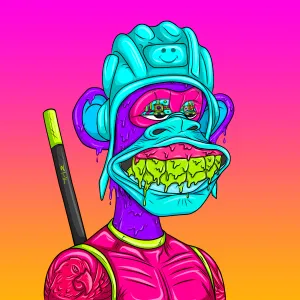Both lawsuits center on Taylor Whitley and his departure from the project, but they diverge considerably from there. Whitley's suit claims that he was wrongly ousted from the project; the other lawsuit claims that Whitley engaged in "unhinged, destructive, and egotistical acts... to sabotage... "Caked Apes", after Whitley failed to usurp ownership and control of the project entirely for himself". They also allege that Whitley misused DMCA takedowns to have the collection removed from online marketplaces. The lawsuits are liable to be complicated somewhat by the fact that a partnership agreement doesn't appear to have ever been written up.
Parts of the "Caked Apes" NFT project team both sue each other
A Robin Hood-esque attacker steals $52 million from Cashio, then returns smaller amounts and pledges to donate the rest to charity
Saber, the providers of the Cashio liquidity pool, published a postmortem of the attack in which they wrote that "We do not have the money to pay back depositors." The hack was the second largest in Solana history, behind the February Wormhole hack. Saber entreated the hacker to return the funds, writing, "accounts with over $100k are often users' life savings on leverage, and many of us will seriously be affected financially after this incident."
On March 28, the attacker sent a message saying that "the intention was only to take money from those who do not need it, not from those who do", and invited users who had over $100,000 to apply to receive their funds back with "an explanation of the source of this money and why you need it back. more detail is better. money will not be refund to rich american and european that don't need it." Somewhat strangely, Cashio themselves began hosting a website to allow affected users to plead with the hacker to return the money.
VeVe marketplace goes offline for over a day after an exploit results in a "large amount of gems being acquired illegitimately"
On March 22, VeVe tweeted that "We have become aware of an exploit of our systems which resulted in a large amount of gems being acquired illegitimately", and that they had closed the market, as well as purchases and transfers of Gems. The market remained closed for over a day as VeVe apparently triaged the problem. It's not clear yet what the impact has been to the platform or its users, though many reported that their NFTs appeared to have plunged in value.
G2 Esports sues NFT provider Bondly, accuses them of using them for publicity
- "G2 Esports files lawsuit against NFT provider Bondly", The Washington Post
Team behind the NeoNexus NFT project raises several million dollars, then abandons it
On March 21, the project's founder Jack Shi wrote on Twitter, "It is with a heavy heart that we must inform you that we can no longer continue healthy development of the NEONEXUS project. We would like to hand over the project to our community, or a community-selected party for takeover if that's feasible / possible." Going into more detail on Discord, he said the project had run out of money, which he blamed on waning interest in Solana NFTs.
The reaction to the announcement was overwhelmingly negative, particularly given the project's founder's apparent habit of bragging about his luxury cars. Many users described the abrupt shutdown as a rug pull, and one user even mentioned looking into a class action suit against the project team.
Phishing scheme promising to animate one's apes nets attacker a collector's three pricey Bored Apes
It appeared from the victim's retweets that they had fallen for a scam shared by a verified Twitter account that claimed to be one of the Bored Apes founders. However, a closer look at the Twitter handle showed it was a hacked account with the username "volt_france", which previously had belonged to the French branch of the Volt Europa political movement.
Hacker steals more than $1.5 million after compromising wallets belonging to crypto whale Arthur_0x
Arthur_0x wrote on Twitter that they had previously only ever used a hardware wallet on their PC, but when they started more regularly trading NFTs they'd started using a hot wallet. "Hot wallet on mobile phone is indeed not safe enough", they wrote on Twitter, "Guess no more hot wallet usage then." They also wrote, "The only thing I can say to the hacker is: you mess with the wrong person" and tweeted the wallet address to which the NFTs were being transferred, asking for it to be blocklisted.
- Tweet by Arthur_0x
- Tweet by Arthur_0x
- Attacker wallet on Etherscan
Hacker steals $1.45 million from OneRing Finance using code that self-destructs after the attack
The hacker complicated things somewhat for OneRing by covering their tracks. They used a "self-destruct" mechanism — typically used by developers to destroy smart contracts that are found to have a bug — to destroy the contract they used to carry out the attack, making it more difficult for OneRing to determine which parts of their codebase were vulnerable and led to the attack.
- "OneRing Finance exploit. Post-mortem — After OShare Hack.", OneRing Finance blog
- Tweet thread by PeckShield
NFT scammers take over the Twitter account of a Florida gubernatorial candidate
The Fried account compromise is only one instance of what has become a trend on Twitter: Twitter accounts belonging to high-profile individuals, or accounts that are verified or have a large number of followers, being compromised and sold to NFT scammers. On March 11, ESPN baseball reporter Jeff Passan also had his twitter account compromised and repurposed to shill Skulltoons NFTs. Skulltoons distanced themselves from that incident, writing that they believed the hackers were trying to scam their NFT community.
- "Hackers hijack Nikki Fried’s campaign Twitter account", Florida Politics
Kaiju Kongz NFT project artificially inflates its floor price by destroying your NFTs if you list them for sale at too low a price
Some NFT collectors criticized the choice. One described it as "illegal market manipulation tactics", and others said the project should grow the floor "organically". Given the rampant manipulation in the NFT space, one wonders if the real criticism collectors have with the project is that they were too transparent about their price manipulation, and should've just done it quietly like other projects have.









